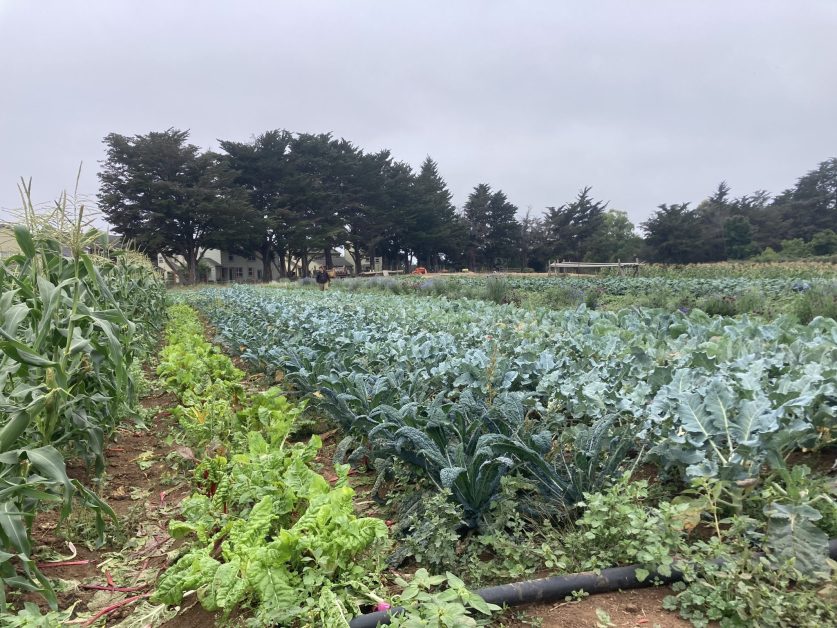Earlier this month, CalCAN helped organize two panels at the inaugural California Earthworkers Summit (CES). The gathering brought together farmers, food justice leaders, and climate stewards for a day of workshops, producer-procurement match-making sessions, and tours of the university farm. The conversations at the Summit echo CalCAN’s priorities and point toward strategies that deserve broader attention statewide.
Sharing Equipment to Support Climate-Smart Practices

At the Equipment Sharing and Cooperative Development session, a panel of farmers and advocates discussed their experiences with equipment sharing and how to coordinate storage, transportation, operation, maintenance, training, and insurance. Panelists shared how equipment sharing can be instrumental in adopting climate-smart agricultural practices like cover cropping and compost spreading. CalCAN’s Associate Policy Director, Anna Larson, shared, “We’ve heard from farmers that access to equipment supports experimentation with healthy soils practices, and supports farm viability and knowledge sharing.” After land, equipment is often the largest expense for farmers, and specialized equipment may only be needed several times a year.
“There are lots of farmers that can be convinced to try something out if the equipment is provided and they don’t have to up front pay for it, even if, in the long run, they end up purchasing the equipment,” said Rebekka Siemens. Siemens farms grains and almonds and helped establish California Plowshares, an equipment-sharing collaborative that supports small-scale producers across the Central Coast and southern San Joaquin Valley. “Even in the 1970s, the planters and harvesters were much smaller, in the 20-50 acre scale. There used to be granges and cooperatives that processed and milled the grain. Farmers are having to reinvent the local scale of planting, harvesting, and processing. Because grain planting and harvesting is done at different times in different climates [within California], with a relatively small amount of equipment, you can cover a lot of area if you follow the seasons.” While the coordination required in both informal and formal equipment shares can be significant, farmers shared that this facilitated farmer-to-farmer education and fostered community.
Proposition 4 to Aid Equipment Sharing
After several years of advocacy by CalCAN and Community Alliance with Family Farmers (CAFF), along with support from a number of farmer and technical assistance providers across the state, CDFA will receive $15 million from Proposition 4 to provide grants for the creation and expansion of regional equipment sharing programs. For more information, please reach out to Anna at anna AT calclimateag.org.
Challenges and Solutions with Land Access and Tenure

At a roundtable discussion on land access and tenure, a panel of four farmers, researchers, and advocates shared their experiences and where they see challenges and opportunities. “As someone that serves Indigenous people, I often think about the first Californians and their relationship to land. People saw themselves as being of the land. Now we see the land as being of the people,” said Cristina Murillo-Barrick. That shift has enabled the commodification and the consolidation of agricultural land in California. Jamie Fanous, Policy and Organizing Director with the Community Alliance with Family Farmers, shared, “The top 5% of landowners in California own half of our agricultural land in the state. In Fresno County, the top 10 percent own 80% of the county. We need to fundamentally rethink how we treat land. It’s a combination of preventing consolidation while simultaneously lifting up community land trusts, farmer cooperatives, and financial investments in communities. We can’t do one without the other.”
Nelson Hawkins, farmer and founder of We Grow Farm in West Sacramento and a founding member of the Ujamaa Farmer Collective, emphasized that land tenure arrangements directly inform on-farm practices. “Those that are leasing land don’t have any incentives to improve the soil health, unless they are there long term.” Doria Robinson, the founder of Urban Tilth, shared about how urban farms in Richmond grew out of relationships with local community members and elected officials. “Urban Tilth was part of a larger political movement. We advocated for an urban agriculture assessment, which led to an urban ag ordinance that made work like ours possible. What we did was political.”
Task Force Draft Recommendations
Both Hawkins and Robinson serve on the California Agricultural Land Equity Task Force. The Task Force is an independent body with staffing support from the Strategic Growth Council that is drafting recommendations to equitably increase access to agricultural land for food production and traditional tribal agricultural uses. The task force has released its draft recommendations, with final recommendations to be released in January of next year.
These panels at the California Earthworkers Summit highlighted how connected land access, equipment sharing, and climate resilience are for California farmers. CalCAN sincerely values the chance to be part of the inaugural Summit and will continue working with farmers, advocates, and policymakers to turn these discussions into meaningful programs and policies.

 The inaugural CA Earthworkers Summit was hosted at UC, Santa Cruz. The farm at UCSC provides students and researchers opportunities to gain hands-on experience and training and advance research in the field of agroecology. The farm produces and distributes over 27,000 pounds of produce to students each year.
The inaugural CA Earthworkers Summit was hosted at UC, Santa Cruz. The farm at UCSC provides students and researchers opportunities to gain hands-on experience and training and advance research in the field of agroecology. The farm produces and distributes over 27,000 pounds of produce to students each year.